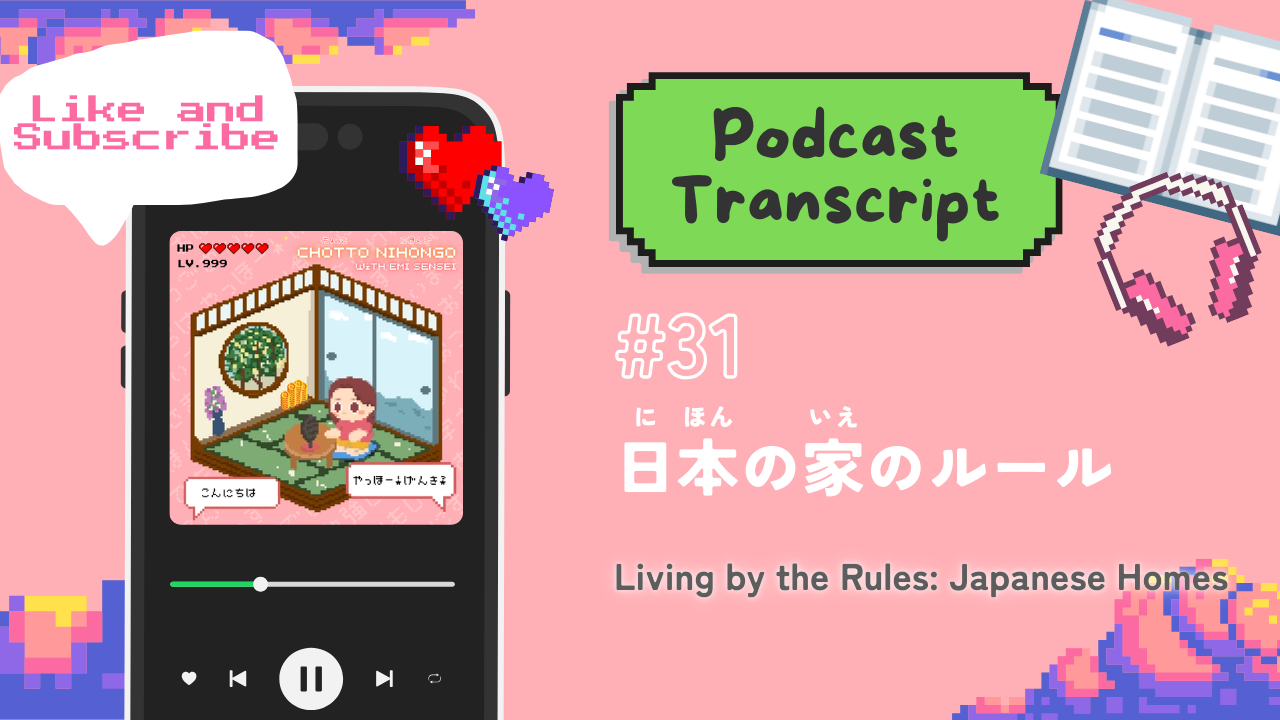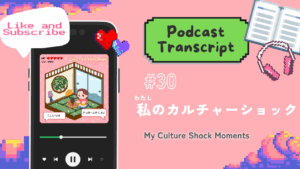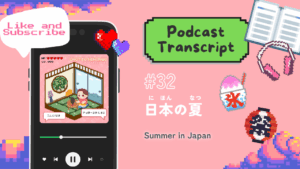おすすめの Google 拡張機能です!新しい言葉を勉強しましょう!
Here are the recommended Chrome extensions! Let’s learn new words here!
ポッドキャストプラットフォーム|Platforms of Podcast
こちらの記事は、配信中のポッドキャストのスクリプトです。
ぜひ、ポッドキャストを聞きながら読んでください。
 えみ先生
えみ先生もう聞いた人は、クイズをチェックしましょう!
ちょっとクイズ!|CHOTTO Quiz!
ポッドキャストを聞いた人は、ちょっとクイズを解いてみましょう。
むずかしいときは、下のスクリプトを読んで、もう一度クイズをチェックしてみてください。
【えいご】English Translation
Answer these quiz questions if you’ve listened to a new episode of my podcast.
If it was difficult, read the transcript below and try again.
❓ 日本の家でスリッパを はいてはいけない場所はどこですか?|Where must you not wear slippers in a Japanese house?
たたみの上ではスリッパをはきません。傷がついてしまうからです。
On tatami, you don’t wear slippers because they would damage the tatami.
❓ お風呂に入る前に何をしなければいけませんか?|What must you do before entering the bath?
シャワーで体を洗わなければいけません。
You must wash your body with a shower.
❓ 日本のゴミのルールで、ペットボトルはどうしますか?|What do you do with PET bottles in Japan’s garbage rules?
ボトル、キャップ、ラベルに分けます。
Separate them into bottle, cap, and label.
ポッドキャストのスクリプト|Transcript of Podcast
エピソード31「日本の家のルール」
このポッドキャストは、初中級(Pre-Intermediate)レベルです。
おはようございます。こんにちは。こんばんは。
日本語の先生、エミです。
みなさん、ちょっと お久しぶりですね。
先週は 私、風邪をひいていました。
I caught a cold.
喉が痛かったんです。 沖縄にいたときに喉が痛くなって、2回 病院に行きました。
でも、毎日 友達や家族と遊んでいて、いそがしかったので 全然 休めませんでした。
だから全然よくなりませんでした。 私が悪いです。😅
でも、そのあと神奈川に帰ってきてゆっくり休んだので、ちょっと よくなりました。
【えいご】English Translation
Good morning. Hello. Good afternoon.
I am a Japanese teacher, Emi.
Everyone, it’s been a little while, hasn’t it?
Last week, I caught a cold. My throat was sore.
While I was in Okinawa, my throat started hurting, and I went to the hospital twice.
But I was busy every day, spending time with friends and family, so I couldn’t rest at all.
That’s why I didn’t get better. It was my fault. 😅
But after I came back to Kanagawa and rested slowly, I felt a little better.
そして、本当は昨日、ポッドキャストをアップロードしたかったんです。
でも、私のポッドキャストとビデオのファイルが全部消えました。
データが全部消えてしまったので、ちょっと大変でした。
データをバックアップして、なんとか新しいポッドキャストを作ることができました。
よかったです。
でも、YouTubeのビデオのデータはバックアップできていません。
かなしい…。😭
もう一度、ゼロから がんばって動画を作りたいと思います。
応援してください。がんばります。
はい。じゃあ…、
【えいご】English Translation
Actually, I wanted to upload a podcast yesterday.
But all my podcast and video files disappeared.
Since all the data was lost, it was a bit tough.
I backed up the data, and somehow I was able to make a new podcast.
That was good.
But I couldn’t back up my YouTube video data.
I’m sad… 😭
I’ll do my best to make the videos again from zero. Please support me!
Okay, then…
ここで先週の質問をチェックしましょう。
先週は こんな質問をしました。
「あなたの国と日本で、家の中のルールは違いますか?」
こんな質問でした。
【えいご】English Translation
Alright, now let’s check last week’s question.
Last week, I asked this question:
“Are the rules inside houses different between your country and Japan?”
That was the question.
先週は、私がアメリカに留学した時に感じた カルチャーショックについて話しました。
今週のテーマも それにちょっと にています。
でも、今週は日本にフォーカスしてお話しします。
テーマは「家でのルール」です。
日本の家には皆さんが知っているルールもあるし、あまり知られていないルールもあります。
今日は、いっしょに チェックしていきましょう。
【えいご】English Translation
Last week, I talked about the culture shock I felt when I studied abroad in America.
This week’s theme is a little similar to that.
But this time, I’ll focus on Japan.
The theme is “Rules at Home.”
Japanese houses have some rules that everyone knows, and also some rules that are not well known.
Let’s check them together today.
まずは有名なルールです。
日本の家の玄関のルール、なにかわかりますか?
日本だけじゃないですね。 アジアの家の玄関のルールです。
みなさん、アジア人の友達の家に行ったとき、玄関で何をしますか?
そうです。くつを脱ぎますね。
でも、どうして くつを脱ぐか知っていますか?
【えいご】English Translation
The first one is a famous rule.
Do you know the rule you follow at the entrance of Japanese houses?
It’s not only Japan—this is also a rule in Asian houses.
When you go to an Asian friend’s house, what do you do at the entrance?
That’s right—you take off your shoes.
But do you know why people take off their shoes?
家の中をきれいにするため。
はい、それも理由の1つです。
でも、実は日本の気候とも関係しています。
気候は、英語でClimate.
日本は湿度が高くて、むしあつい国です。 Humidですね。
だから、玄関はちょっとワンステップ高くなっています。
床を湿気から守るためです。
そして、日本人は いすじゃなくて、たたみの上に座ったり、ふとんで寝たりしてきました。
今はいろんなスタイルの家がありますけど、昔は たたみの家が多かったです。
だから、今も日本人は くつを脱ぐ習慣(Custom)があります。
【えいご】English Translation
One reason is to keep the house clean.
Yes, that’s one reason.
But actually, it’s also related to Japan’s climate.
Japan has high humidity and is a hot, humid country.
Because of this, entrances are built one step higher.
It’s to protect the floor from humidity.
Also, Japanese people used to sit on tatami instead of chairs, and sleep on futons.
Nowadays, there are many different house styles, but in the past there were many tatami houses.
So, even today, Japanese people have the custom of taking off shoes.
そして、くつを脱いだあとは スリッパを履きます。
でも、日本には トイレ用のスリッパもあります。
家のスリッパとトイレのスリッパ、別です。ちがうスリッパです。
これはどうしてかわかりますか?
トイレは、ちょっと きたないイメージがありますよね。
だから、ほかの部屋、リビングとかキッチン、ベッドルームにトイレのバイキン(バクテリア)を持っていかないように、トイレだけのスリッパを使います。
外国の人はたくさんの人がびっくりします。
【えいご】English Translation
And after taking off shoes, people wear slippers.
But in Japan, there are also toilet slippers.
The slippers for the house and the slippers for the toilet are separate. They are different ones.
Do you know why?
The toilet has a bit of a dirty image, right?
So people use toilet-only slippers, to avoid carrying toilet bacteria into other rooms like the living room, kitchen, or bedroom.
Many foreigners are surprised by this.
みなさんの国にはトイレのスリッパはありますか?
そして、玄関で くつを脱いでスリッパを履きますか?
あ、でも 1つ大事なルールがあります。
日本人は家の中でスリッパを履く人 たくさんいますけど、スリッパを履いてはいけないところがあります。
どこですか?わかりますか?
スリッパがダメな場所。
それは、たたみです。
たたみの上ではスリッパを脱ぎましょう。
たたみはリラックスする場所なので、スリッパで歩きません。
スリッパで歩くと傷ついてしまいます。
だから、たたみがある家に行くときは気を付けてください。
【えいご】English Translation
In your country, do you have toilet slippers?
And do you take off your shoes at the entrance and wear slippers?
Oh, but there is one important rule.
Many Japanese people wear slippers in the house, but there is one place you must not wear them.
Where is it? Do you know it?
The place that’s not good to wear slippers on…
That’s tatami.
On tatami, you should take off slippers.
Tatami is a place to relax, so people don’t walk on it with slippers.
If you walk with slippers, it gets damaged.
So when you visit a house with tatami, please be careful.
次は、お風呂のルールです。
日本のお風呂はちょっと特別です。スペシャルです。
日本のお風呂には、バスタブがありますね。
バスタブは日本語で「浴槽」と言います。
浴槽に入る前に必ずシャワーで体を洗います。
温泉でも同じルールですね。
でも、どうして最初に体を洗いますか?
これも理由がわかりますか?
【えいご】English Translation
Next one is the bath rule.
Japanese baths are a little special.
In Japanese baths, there is a bathtub. We call it 浴槽 (yokusoo.)
Before entering the bathtub, you must wash your body with a shower.
It’s the same rule at hot springs.
But why do we have to wash our body first?
Do you know why?
理由は、お風呂のお湯はみんなでシェアするからです。
みんながそれぞれ新しいお湯を使うと大変です。
しかも、お金もたくさんかかります。
だから、きれいに体を洗ってから入るんです。
友達の家でお風呂に入るとき、温泉に入るとき、ルールとマナーをチェックしてみてくださいね。
はい。
【えいご】English Translation
The reason is because we share the bathwater.
If everyone used new water each time, it would be hard
and very expensive.
So people wash their bodies clean before entering.
When you take a bath at a friend’s house or go to a hot spring, check the rules and manners.
次は、ちょっと昔のルールです。今は変わっていると思います。
昔、家族で夕ごはんを食べるときは、お父さんが一番最初に食べていました。
そして、お風呂も一番最初でした。
どうしてお父さんが一番最初ですか?
考えてみてください。
どうですか?わかりましたか?
【えいご】English Translation
The next one is a little old rule from the past. It has probably changed now.
In the past, when families aeat dinner, the father would eat first.
And he also took the first bath.
Why do you think the father was first?
Please think about why.
Did you come up with the answer?
夕ご飯は、お父さんが最初。お風呂も一番最初。
これは働いている人にリスペクトをする文化です。
でも、今はお母さんも働いているし、子供たちも いそがしいです。
だから、このルールはあまり残っていません。
みなさんの国も、誰が一番最初にご飯を食べるか、お風呂に入るか、ルールがありますか?
ぜひ教えてください。
【えいご】English Translation
The father first for dinner and a bath.
It was to show respect to the person working.
But now, mothers also work, and children are also busy.
So this rule is not kept much anymore.
In your country, is there a rule about who eats first or who takes the bath first?
Please tell me.
最後はゴミのルールです。ゴミ。
日本のゴミのルールは、とても きびしいです。
たとえば、ペットボトルは、ボトル、キャップ、ラベルに分けます。
カンはカンだけ。ビンはビンだけ。
ダンボールは、ひもでまとめます。
お菓子のゴミは もえるゴミかもしれませんけど、プラスチックだったらプラスチックのゴミ袋に入れます。
ちょっと大変ですよね。
ゴミを分けることを、「ゴミの分別」と言います。
分別。
【えいご】English Translation
Lastly, there is the rule about garbage.
Japanese garbage rules are very strict.
For example, PET bottles are separated into bottle, cap, and label.
Cans are only cans, bottles are only bottles.
Cardboard is tied together with a string.
Snack wrappers may be burnable garbage, but if they’re plastic, they go into plastic garbage bags.
It’s a little difficult.
Separating garbage is called “ゴミの分別 (gomi no bunbetsu)” in Japanese.
日本はプラスチックのゴミが多いです。
これは よくないことですけど、分別をしているのでたくさんリサイクルができています。
ペットボトルのリサイクルは、日本が世界で一番だそうです。
これからも、みんなが がんばってゴミを減らせるといいですよね。
【えいご】English Translation
Japan has a lot of plastic garbage.
which is not a good thing, but because we separate it, a lot can be recycled.
Japan is said to be number one in the world for PET bottle recycling.
I hope everyone keeps working hard to reduce garbage just like we have done.
はい。
今日は日本の家でのルールを話しましたが、どうでしたか?
1 玄関で靴を脱ぐ。
2 家のスリッパ・トイレのスリッパ
3 お風呂はシャワーをしてから入る。
4 昔のルール:お父さんが最初。ご飯も最初。お風呂も最初。
5 ゴミの分別
はい。
みなさんの国ではどうですか?
日本と同じルールはありますか?それとも全然ちがいますか?
ぜひ、コメントで教えてください。
【えいご】English Translation
So, today I talked about rules in Japanese homes. How was it?
- Take off your shoes at the entrance
- House slippers and toilet slippers
- Wash your body before entering the bath
- Old rule: father eats and bathes first
- Garbage separation
What about in your country?
Do you have the same rules as Japan? Or are they completely different?
Please tell me in the comments.
では、今日も みなさんに 質問があります。
「あなたの国の夏はどんなふうに過ごしますか?」
もう少しで8月が終わりますね。
まだまだ暑いですけど、夏のイベントはそろそろ終わりそうです。
日本の夏はお盆があったり、花火大会があったり、夏のイベントがあります。
次のポッドキャストは、日本の夏のイベントについて話します。
みなさんはどんな夏のイベントを知っていますか?
ぜひ コメントで教えてください。お願いします。
【えいご】English Translation
Now, I have a question for you today, as always.
“How do you spend summer in your country?”
August is almost over.
It’s still hot, but summer events are about to finish.
In Japan, there are Obon, fireworks festivals, and other summer events.
In the next podcast, I will talk about summer events in Japan.
What summer events do you know?
Please tell me in the comments. Thank you.
今日のポッドキャストのスクリプトは、私のウェブサイトにあります。
ウェブサイトは、 en-nihongo.com です。
よかったら、ポッドキャストの感想や、質問の答えをコメントで教えてください!
じゃあ、また来週のポッドキャストで会いましょう。
じゃあね~!
【えいご】English Translation
A transcript for today’s podcast is on my website.
The website is en-nihongo.com .
I’d be very happy if you could share your thoughts/impressions or could answer the question I asked in this episode!
I’ll see you in the next episode.
Jaa ne-!







コメント|Comment